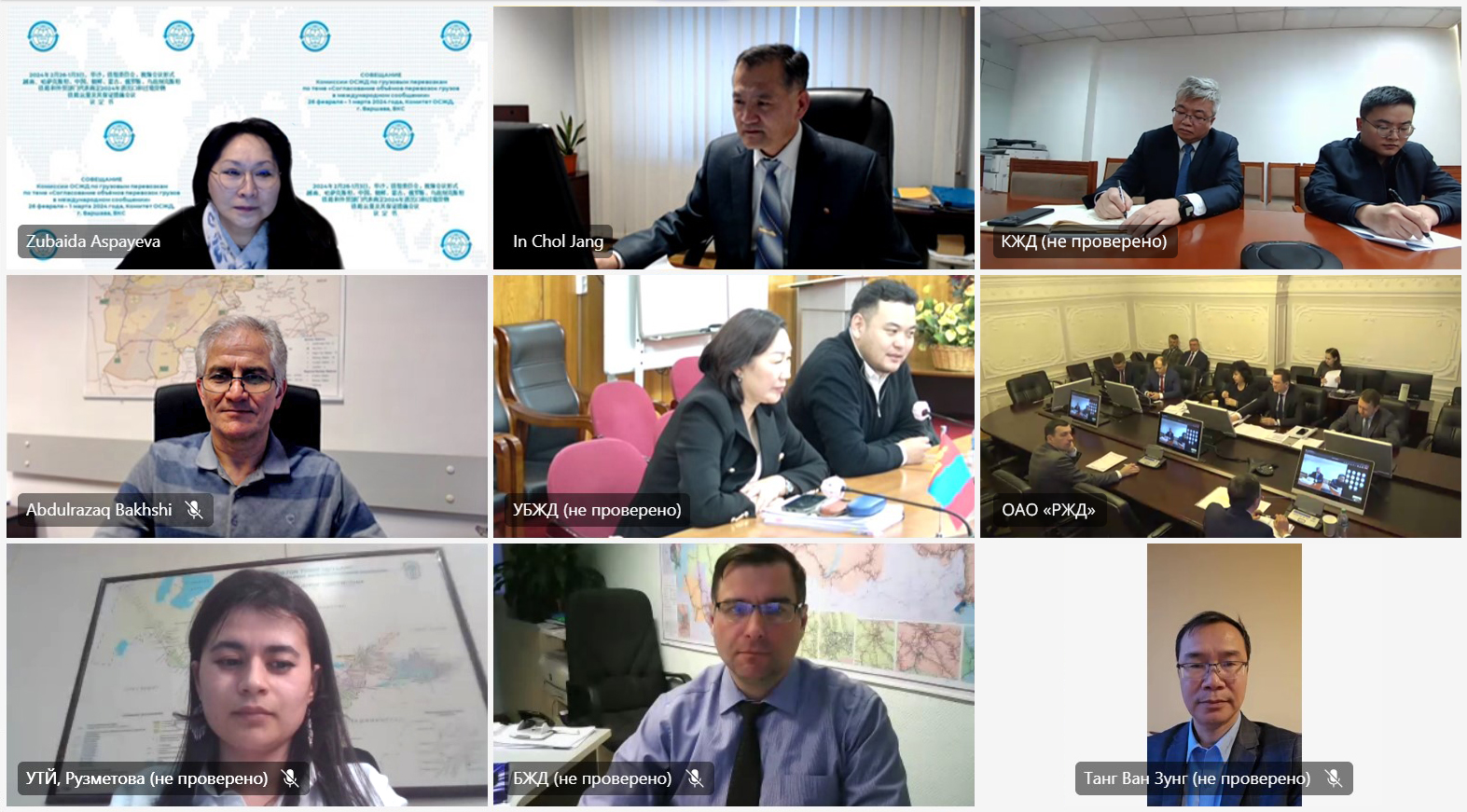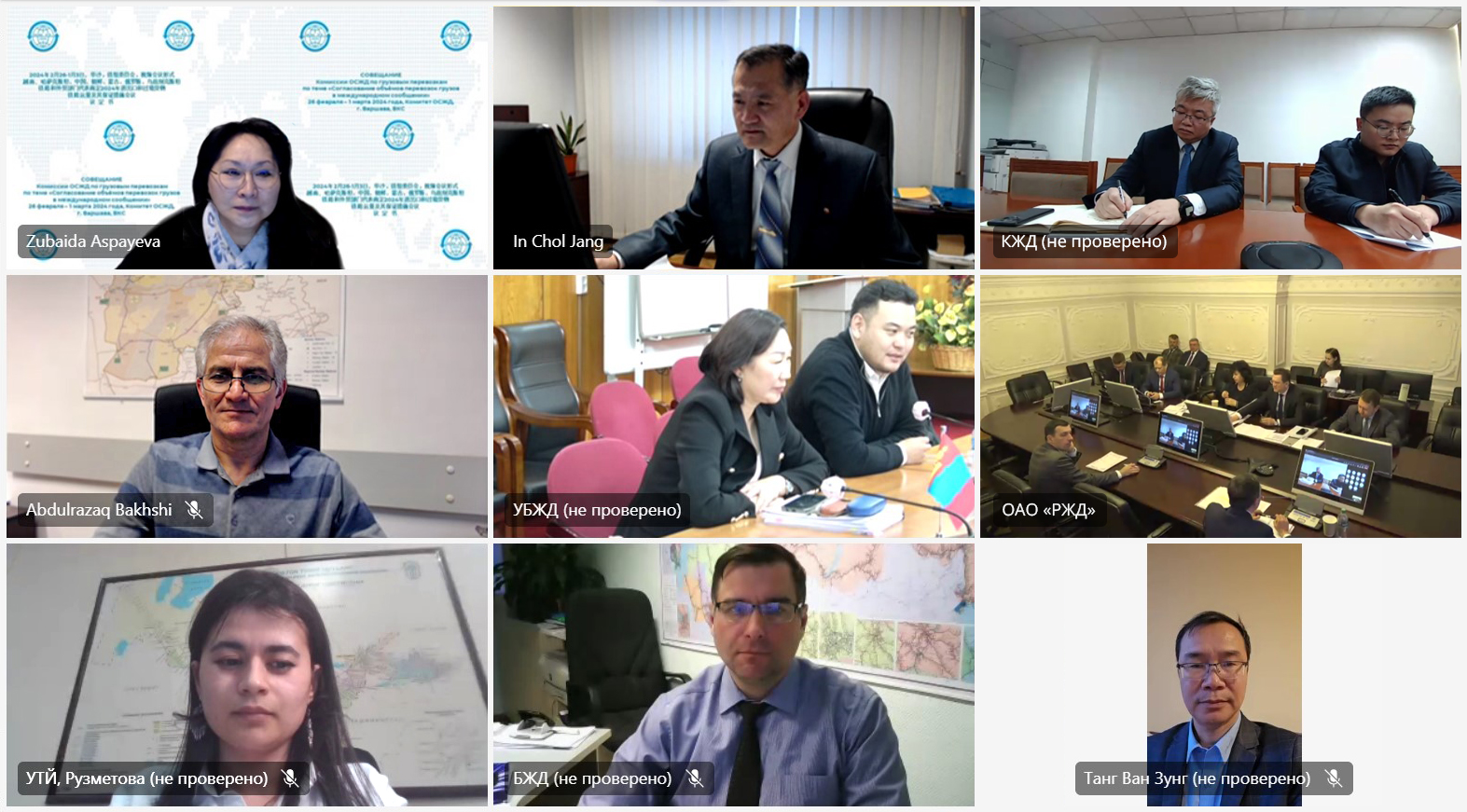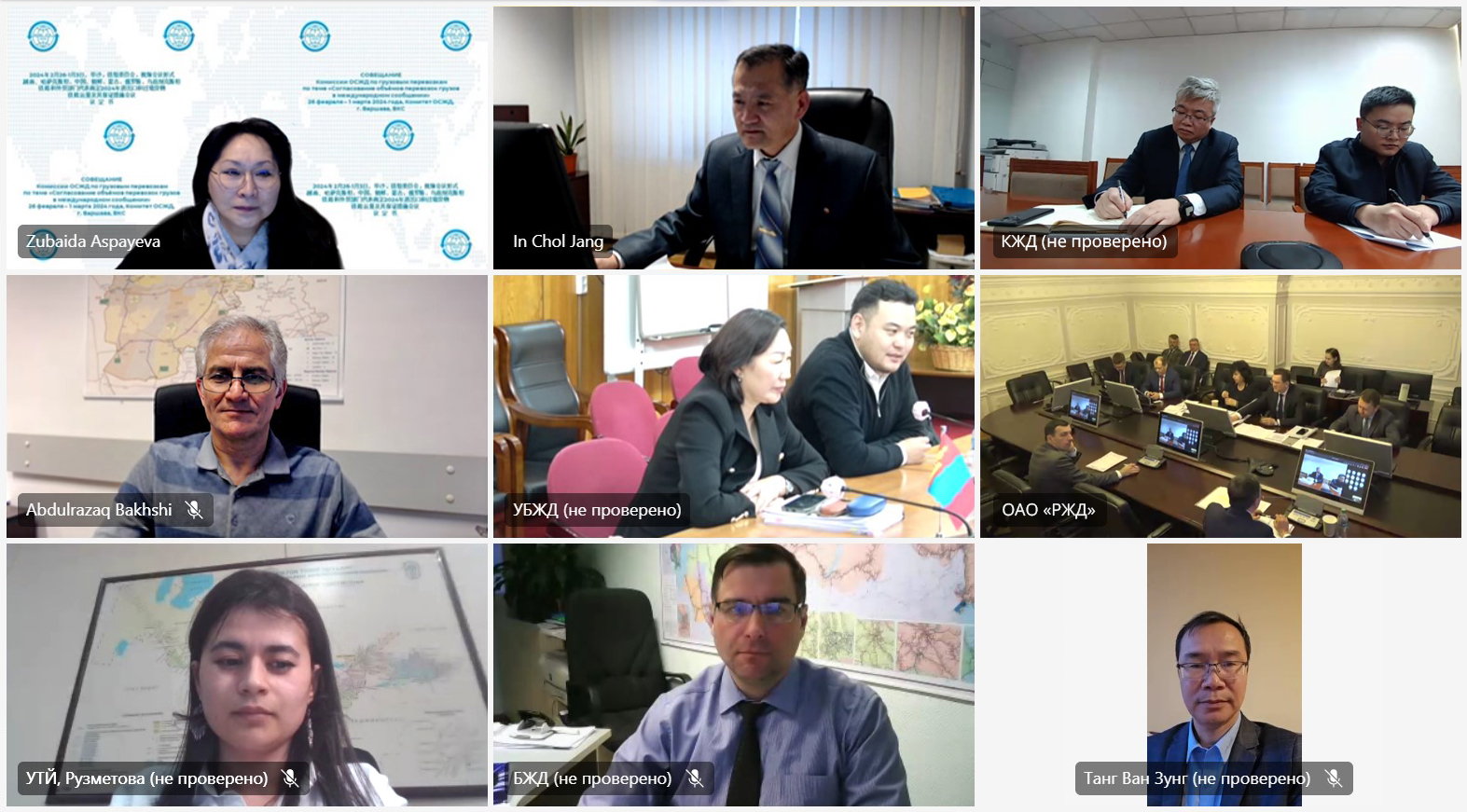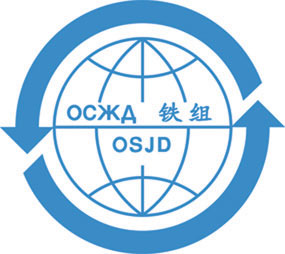Meeting on coordination of the volumes of goods carried in international freight traffic



In accordance with the Work Plan of the OSJD Commission on Freight Traffic for 2024 under the subject “Coordination of the volumes of the goods carried in international freight traffic”, the meeting was held in the period from 26 February till 1 March 2024 (OSJD Committee, Warsaw) in a videoconferencing mode of the representatives from the railways and foreign trade organisations of the Republic of Belarus, Socialist Republic of Vietnam, Republic of Kazakhstan, People’s Republic of China, Democratic People’s Republic of Korea, Mongolia, Russian Federation, Turkmenistan, Republic of Uzbekistan, Islamic Republic of Afghanistan and Islamic Republic of Iran for the coordination of the volumes of export, import and transit goods carried by railway transport for 2024 and the measures to ensure them (hereinafter referred to as the meeting).
The meeting was attended by the representatives of the delegations from the railways of the OSJD member countries and of foreign trade organisations from the following countries: Republic of Belarus, Socialist Republic of Vietnam, Republic of Kazakhstan, People’s Republic of China, Democratic People’s Republic of Korea, Mongolia, Russian Federation, Turkmenistan, Republic of Uzbekistan, Islamic Republic of Afghanistan, Islamic Republic of Iran (hereinafter referred to as the Parties), as well as representatives of the Korea Railroad Corporation (KORAIL), UTLC ERA JSC (an OSJD affiliated enterprise) and the OSJD Committee.
The meeting participants were welcomed by Attila Kiss, Executive Secretary of the OSJD Committee, and Chairperson of the OSJD Commission on Freight Traffic, Zubaida Aspayeva, who expressed their gratitude to all the delegations for their participation in the meeting to make decisions related to the important and practical issues of coordination of the volumes of the foreign trade goods and the measures to ensure the smooth organisation of their transportation in international railway traffic and the efficient use of railway transport, having wished the participants a fruitful and successful work.
The meeting was chaired by Jang In Chol, Specialist of the OSJD Commission on Freight Traffic.
The meeting participants approved the following items to be included in the agenda:
- summing up the totals of the volumes of transportation of goods in 2023;
- coordination of the volumes of export, import and transit goods by railway transport for 2024 and their distribution by quarters and types of goods for each border crossing point;
- development of technical and organisational measures to implement the agreed volumes of transportation of goods in 2024;
- proposals made by railways;
- agreeing on the date and venue of the next meeting in 2025;
- AOB
Items 1-4 of the agenda meeting were considered at the sub-meetings of fifteen Subgroups, the composition of which was agreed by the delegations participating in the meeting.
The meetings of the following Subgroups were held:
- Subgroup II RZD OJSC-KZD – with the participation of BC;
- Subgroup V KZD-UBZD-RZD OJSC – with the participation of BC;
- Subgroup VIII KZD-KZH – with the participation of RAI;
- Subgroup IX KZD-KZH-RZD OJSC – with the participation of BC;
- Subgroup XII KZD-KZH-UTI – with the participation of TRK, АRА and RAI;
- Subgroup XIII VZD-KZD-KZH – with the participation of RZD OJSC and UBZD;
- Subgroup XVI BCRZJ OJSC-KZH-UTI – with the participation of TRK, АRА and RAI;
- Subgroup XVIII UTI-АRА – with the participation of KZH;
- Subgroup XIX TRK-АRА – with the participation of KZH.
The delegations from BC, VZD, KZH, KZD, ZC, UBZD, RZD OJSC, TRK, UTI, ARA and RAI (hereinafter referred to as the Parties) informed the meeting participants on the implementation of the transportation volumes of foreign trade goods for 2023, carried between the countries, and the organisational and technical measures that were taken to provide them.
The BC delegation informed that the volumes of goods transported in 2023 from the Republic of Belarus in transit through the territory of the Russian Federation and the Republic of Kazakhstan to the People’s Republic of China have amounted to 2.6 million tonnes. The goods were transported only in containers.
The ARA delegation provided the meeting participants with their data related to the volumes of export, import and transit goods carried by railway transport for 2023, as well as provided a forecast for 2024 on the volumes of the goods to be transported from Afghanistan to Uzbekistan and third countries (export, import and transit) via Hairatan border station, from Afghanistan to Turkmenistan and third countries (export, import and transit) through Aqina border station, from Afghanistan to Turkmenistan and third countries (export, import and transit) through Torghundi border station, and from Afghanistan to Iran and third countries (export, import, transit) through Chokhe Surkh border station.
The delegations of Iran and Turkmenistan informed the meeting about their data as concerned the volumes of export, import and transit goods carried by railway transport for 2023.
The Parties have coordinated and agreed on the volumes of export, import and transit goods for 2024 and their distribution by quarters, for each border crossing point, and by types of goods.
For the purposes of identification of the titles of goods, when coordinating the monthly plans for the transportation of goods, the Parties agreed on the nomenclature of export, import and transit goods.
The Parties agreed that when signing contracts for the delivery of goods in excess of the freight volumes coordinated for 2024, the possibility of implementation of the carriage of such goods will be considered and decided only when the monthly operational plans are agreed, taking into account the handling capacities of border crossing points.
The Parties agreed that “The transportation of goods in containers” in the reporting and planned years will be measured in 20-foot equivalent units (TEU) as well, with loaded and empty containers taken into account.
Organisational and technical measures have been agreed to ensure the implementation of the agreed volumes of transportation of export, import and transit goods for 2024.
Further work is required to reduce the time that wagons and locomotives spend at border stations by:
- compliance with the norms of SMGS and SI to SMGS;
- improving the uniformity of transportation of foreign trade goods (except seasonal) throughout the year, quarters and months;
- timely provided formation of trains and their departure strictly according to the agreed timetables;
- speeding up the turnover of locomotives and wagons;
- transportation routing of bulk cargoes (coal, coke, crude oil, oil products, metal ore, fertilisers, timber and other);
- taking possible measures to avoid disconnections of container trains;
- timely cleaning of empty wagons after unloading and expediting their return to their own railways;
- improving the technological processes for the handover of trains in international traffic in strict compliance with the requirements of the SMGS Agreement, SI to SMGS and PGW Rules;
- improving the systems of mutual exchange of information between the border railways on the availability, approach of goods and wagons to the border stations; - taking the relevant measures to improve the technical condition of freight wagons, preventing the dispatch of the goods in wagons that do not meet the technical requirements of PGW Rules.
In order to avoid a long idle time of wagons at the border stations when goods are transported by transit railways, column 23 of the SMGS consignment note is to indicate the name of the payer for each of the carriers.
The Parties noted the importance of maintaining a coordinated transport policy in the organisation of international transport within the framework of existing agreements and contracts, and agreed to continue working with consignors and forwarding companies to take measures to correctly fill in transportation documents.
To ensure the smooth handover of trains with foreign trade goods at the border crossing points, the Parties will carry out monthly planning of freight transportation. The volumes of transportation of foreign trade goods will be monthly transmitted for coordination by telegrams, fax, telex or e-mail between the central administrations of the railways involved in the transportation, according to the established nomenclature of goods no later than 10 days before the start of the planned month. Replies on the accepted traffic volumes shall be reported within three working days upon receipt of the request.
The parties confirmed the importance of adhering to the deadlines for granting approval referred to in this paragraph.
In the telegrams on coordination of the volumes of transportation of foreign trade goods the following information will be indicated: the country of departure, the country of destination, the name of the border stations, the name of the goods, the number of tons, wagons or containers (with indication of their dimensions in feet and type).
Furthermore, in addition, to coordinate transportation of goods to the third countries, the names of carriers on the European railways will be indicated in accordance with Annex 5 “Information Guide” to the SMGS Agreement, destination stations and forwarding organisations paying for transit to the railways.
The goods that were not envisaged for transportation through the border stations according to the plan, as well as the goods presented for transportation as a result of additional contracts can be accepted for transportation only after obtaining consent to their acceptance from the railways involved in the transportation.
Once the acceptance of an additional amount of goods has been agreed, the border railways and stations will be simultaneously informed about the corresponding increase in the average daily rate of transfer of goods by nomenclature and in tons.
The carrier that accepted the application for the carriage of goods is obliged to agree it in accordance with the established procedure. The carriers must respond within three business days after receiving a request for transportation.
In order to reduce the time of the coordination of freight traffic volumes and conditions for information exchange, it is necessary to additionally use the electronic mail of the specialists directly responsible for these issues.
The Parties:
- have agreed the request template for coordinating the transportation of goods in containers as part of container trains. The exchange of messages will be carried out by e-mail;
- agreed to send an Excel spreadsheet at the same time as the existing request exchange procedure;
- will make every possible effort to organise operational cooperation in terms of removing barriers that impede regular transportation.
In accordance with the agreed monthly volumes of transportation of goods and additional applications for transportation of individual goods, the border stations must ensure unimpeded reception and exclude cases of unreasonable refusal to accept the agreed volumes of cargo. The goods that are loaded according to the plan of the previous month, but will arrive at the border stations in the next month, will be accepted without hindrance.
The Parties will take measures for transportation of freezing goods mainly in the 2nd and 3rd quarters and will inform their consignors about the need to take preventive measures against their freezing in the winter. Crude oil and viscous oil products must be transported in the tanks equipped with the bottom discharge devices.
The Parties will take the necessary measures to comply with the requirements of the SMGS Agreement in terms of high-quality processing of transportation documents, preparation of containers, packaging, marking, compliance with the rules for loading and securing goods, sealing wagons and containers, as well as by reliable indication and correspondence in the transportation documents of the number and signs of seals to the number and signs of seals actually located in the wagon and container.
When dangerous goods are transported, measures will be taken to unconditionally comply with the provisions of the SMGS Agreement in terms of inserting information into the transport documents provided for by the “Rules for the Carriage of Dangerous Goods” (Annex 2 to the SMGS) and high-quality application of hazard signs and markings placed on the wagons, containers and goods.
The parties will request the foreign trade organisations of the Socialist Republic of Vietnam, Republic of Kazakhstan, China, DPRK, Mongolia and Russian Federation, consigning the goods to be reloaded, to provide under contracts concluded the containers and packaging that can ensure the safety of goods during transportation and reloading, as well as the formation of goods packages that do not require examination for reloading.
For the purposes of speeding up the reloading operation and ensuring the safety of goods, measures will be taken to optimise the use of containers during the transportation of goods.
In the event of accumulation of the wagons loaded with export goods (including goods in containers) on the border railways, the central railway administrations, border railways and border stations will take joint measures to improve interaction and increase the daily reception and handover of trains in excess of the established ransfer rate. At the same time, the railway of the receiving party shall provide the required number of empty wagons (including flat wagons) for loading at the border station in order to increase the efficiency and volumes of reloading.
The parties will inform the foreign trade organisations and freight forwarders (operators) about the amendments and supplements made in the SMGS Agreement and SI to SMGS.
To optimise the operation of rolling stock, the Parties will work with all stakeholders engaged in the transportation (rolling stock operators, freight forwarders, consignors, etc.) to consider the logistics schemes that reduce the mileage of empty wagons.
In order to ensure the smooth transfer of goods across border crossings, the Parties will inform each other in advance of the introduction/withdrawal of restrictive measures by state authorities.
For the purpose of long-term and monthly planning, it is necessary to inform all participants of the meeting about changes in the tariff policy in a timely manner.
The Parties will strive to switch to paperless technology using information systems when organising the planning and implementation of freight transportation in international traffic.
To timely and efficiently meet the needs of consignors in transportation of goods and improve the use of rolling stock and better the operation of border crossings, the Parties have deemed it necessary to carry out the activities agreed for 2024:
The importance of legal regulation of international transportation of contain- ers in container trains was noted, and therefore the countries were called upon to join the Agreement on International Transportation of Containers by Container Trains (effective from 1 January 2022), developed within the framework of OSJD. As of 1 January 2024, 14 companies were parties to the Agreement.
The head of delegation of Mongolia informed the meeting participants that Mongolia was prepared to host a regular meeting of the representatives of railways and foreign trade organisations of the Republic of Belarus, Socialist Republic of Vietnam, Republic of Kazakhstan, People’s Republic of China, Democratic People’s Republic of Korea, Mongolia, Russian Federation, Turkmenistan, Republic of Uzbekistan, Islamic Republic of Afghanistan and the Islamic Republic of Iran on the coordination of the volume of transportation of export, import and transit goods carried by railway transport for 2025 and the measures to provide them in 2025 in Mongolia.
The meeting participants gratefully accepted the kind-hearted invitation of the delegation of Mongolia.
The meeting Chairman expressed his gratitude and appreciation to the delegations of the railways of the OSJD member countries and the meeting participants for their work performed at a high professional level when the agenda items were deliberated and the agreed decisions were made, while the meeting participants underlined the high level of organisation and conduct of the meeting in the videoconferencing mode and expressed their gratitude to the Chairperson and working staff of the OSJD Commission on Freight Traffic and the staff members of the OSJD Committee.
